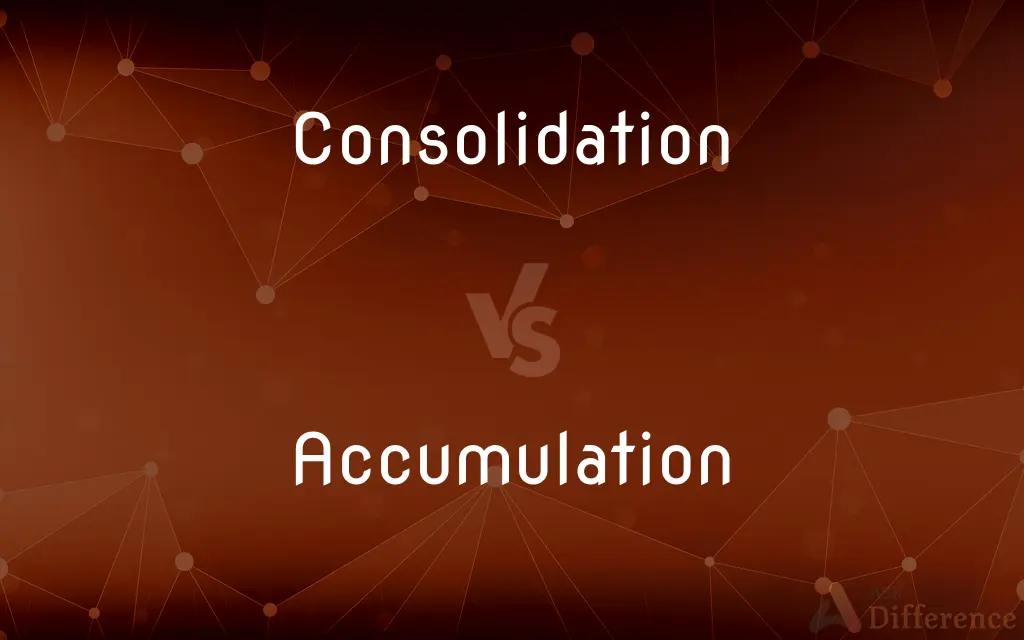Consolidation vs. Accumulation — What's the Difference?
By Tayyaba Rehman & Urooj Arif — Updated on March 30, 2024
Consolidation is the process of combining assets, liabilities, or other financial items of two or more entities into one. Accumulation refers to the gradual gathering or increase of an asset or resource over time.

Difference Between Consolidation and Accumulation
Table of Contents
ADVERTISEMENT
Key Differences
Consolidation often involves the merging of companies or assets to form a single entity, aiming for efficiency or growth. Whereas, accumulation is the process of an investor or entity gradually increasing their holdings in a particular asset, focusing on long-term growth or value.
In consolidation, the primary goal is to streamline operations, reduce costs, or enhance market presence by merging entities. On the other hand, accumulation is about strategically increasing one’s stake in assets, often seen in investment strategies where investors buy stocks or commodities over time.
Consolidation can lead to the centralization of decision-making and resource allocation, making an entity more agile and competitive. Meanwhile, accumulation emphasizes personal or organizational wealth growth, relying on the principle of compounding or strategic investment.
While consolidation is a strategic move often seen in corporate finance and business operations, accumulation applies more broadly, including savings, investment portfolios, and even knowledge acquisition.
Consolidation can result in significant changes in corporate structure, including layoffs or the integration of technologies. In contrast, accumulation is a more individualized strategy, focusing on the incremental growth of assets without necessarily altering the structure of the investment or entity involved.
ADVERTISEMENT
Comparison Chart
Definition
Combining two or more entities into one
Gradually gathering or increasing an asset or resource
Primary Goal
Enhance efficiency, growth, or market presence
Increase holdings for long-term value
Scope
Corporate finance, mergers, and acquisitions
Investments, savings, wealth building
Impact on Structure
Can significantly alter corporate or financial structure
Minimal to no effect on structure
Strategic Focus
Streamlining operations, reducing costs, expanding presence
Long-term growth, compounding, strategic asset accumulation
Compare with Definitions
Consolidation
Merging of two companies into one.
The consolidation of the firms resulted in a more robust market competitor.
Accumulation
Gradual increase of an asset.
His accumulation of rare books took decades.
Consolidation
Reduction of debt by converting it into a single loan.
They opted for debt consolidation to manage their finances better.
Accumulation
Gathering of wealth or assets.
Their family's accumulation of wealth was impressive.
Consolidation
Combining financial statements of parent and subsidiary.
Post-acquisition, consolidation of financial statements was mandatory.
Accumulation
Strategic buying of stocks over time.
Through accumulation, she built a substantial portfolio.
Consolidation
Centralization of processes or operations.
The company's consolidation of its manufacturing units cut down costs.
Accumulation
Building up of resources or commodities.
The company's accumulation of raw materials safeguarded it against market volatility.
Consolidation
Strengthening of positions or policies within an organization.
The new CEO's first move was the consolidation of power within the headquarters.
Accumulation
Collection of knowledge or skills over time.
His accumulation of culinary skills made him a renowned chef.
Consolidation
The act or process of consolidating.
Accumulation
The acquisition or gradual gathering of something
The accumulation of wealth
Consolidation
The state of being consolidated.
Accumulation
The act of gathering or amassing, as into a heap or pile
"Little things grew by continual accumulation" (Samuel Johnson).
Consolidation
The merger of two or more commercial interests or corporations.
Accumulation
The process of growing into a large amount or heap
The steady accumulation of knowledge.
Consolidation
The act or process of consolidating, making firm, or uniting; the state of being consolidated
Accumulation
An amount that has accumulated or been accumulated
An accumulation of debt.
Consolidation
The combination of several actions into one.
Accumulation
The act of amassing or gathering, as into a pile.
Consolidation
(medicine) A solidification into a firm dense mass. It is usually applied to induration (swelling or hardening of normally soft tissue) of a normally aerated lung.
Accumulation
The process of growing into a heap or a large amount.
An accumulation of earth, of sand, of evils, of wealth, or of honors
Consolidation
The act or process of consolidating, making firm, or uniting; the state of being consolidated; solidification; combination.
The consolidation of the marble and of the stone did not fall out at random.
The consolidation of the great European monarchies.
Accumulation
A mass of something piled up or collected.
Consolidation
To organic cohesion of different circled in a flower; adnation.
Accumulation
(legal) The concurrence of several titles to the same proof.
Consolidation
The combination of several actions into one.
Accumulation
(accounting) The continuous growth of capital by retention of interest or savings.
Consolidation
Combining into a solid mass
Accumulation
(finance) The action of investors buying an asset from other investors when the price of the asset is low.
Consolidation
The act of combining into an integral whole;
A consolidation of two corporations
After their consolidation the two bills were passed unanimously
The defendants asked for a consolidation of the actions against them
Accumulation
The practice of taking two higher degrees simultaneously, to reduce the length of study.
Consolidation
Something that has consolidated into a compact mass;
He dropped the consolidation into the acid bath
Accumulation
The act of accumulating, the state of being accumulated, or that which is accumulated; as, an accumulation of earth, of sand, of evils, of wealth, of honors.
Accumulation
The concurrence of several titles to the same proof.
Accumulation
An increase by natural growth or addition
Accumulation
Several things grouped together or considered as a whole
Accumulation
The act of accumulating
Accumulation
(finance) profits that are not paid out as dividends but are added to the capital base of the corporation
Common Curiosities
How does consolidation affect a company?
It can streamline operations, reduce costs, and enhance market presence by combining resources and operations.
What is the goal of accumulation in investments?
The goal is to gradually increase holdings in an asset for long-term growth or value.
What is accumulation?
Accumulation refers to the gradual gathering or increase of assets or resources over time.
Is accumulation only relevant to financial assets?
No, it can also refer to the gathering of non-financial assets like knowledge or commodities.
Why is accumulation important in investing?
It leverages the power of compounding and strategic buying to build wealth over time.
What is consolidation?
Consolidation is the process of merging two or more entities into a single entity.
Can consolidation lead to layoffs?
Yes, consolidations often result in organizational restructuring, which can include layoffs.
Can consolidation apply to debts?
Yes, debt consolidation involves combining multiple debts into a single, more manageable loan.
How does consolidation impact market competition?
It can create larger, more competitive entities with greater market share and resources.
How does the structure of an entity change after consolidation?
It often becomes more centralized, with combined operations and possibly a new corporate identity.
Can an individual engage in consolidation?
While typically a corporate action, individuals can engage in forms of consolidation, like debt consolidation.
Is accumulation a quick process?
No, accumulation is generally a slow, strategic process focused on long-term growth.
What is a key difference between consolidation and accumulation?
Consolidation is about merging entities for efficiency, while accumulation focuses on growing assets or resources.
What role does strategy play in accumulation?
Strategic accumulation involves careful selection and timing of asset purchases for optimal growth.
Why might an investor choose accumulation over immediate, large-scale investment?
To mitigate risk, take advantage of dollar-cost averaging, and build investments thoughtfully over time.
Share Your Discovery

Previous Comparison
Onery vs. Ornery
Next Comparison
Character vs. WordAuthor Spotlight
Written by
Tayyaba RehmanTayyaba Rehman is a distinguished writer, currently serving as a primary contributor to askdifference.com. As a researcher in semantics and etymology, Tayyaba's passion for the complexity of languages and their distinctions has found a perfect home on the platform. Tayyaba delves into the intricacies of language, distinguishing between commonly confused words and phrases, thereby providing clarity for readers worldwide.
Co-written by
Urooj ArifUrooj is a skilled content writer at Ask Difference, known for her exceptional ability to simplify complex topics into engaging and informative content. With a passion for research and a flair for clear, concise writing, she consistently delivers articles that resonate with our diverse audience.
















































